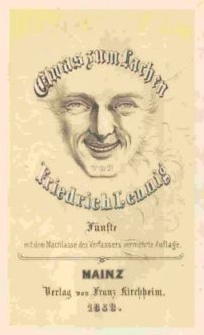Friedrich Lennig
Johann Friedrich Lennig , also: Fritz Lennig (born November 3, 1796 in Mainz ; † April 6, 1838 ibid), was a German dialect poet of the Mainz and Rheinhessen dialect .
family
Friedrich Lennig is the son of Mainz tradesman Nicholas Lennig and his wife Elisabeth, born Menzler. Lennig attended the Rabanus-Maurus-Gymnasium in Mainz and the philosophical course of the episcopal seminary . Then he learned his father's trade in a canvas shop in St. Gallen . Since the young man did not recognize his purpose in life in being a merchant , he returned to Mainz in 1818. The Bishop of Mainz, Joseph Ludwig Colmar, was one of the regular guests in the Lennig family . Well-known family members of the merchant Nikolaus LennigEdmund Georg Nicolaus Hardy , Ruth Moufang , Nicola Moufang , Eugen Moufang , Franz Moufang , Wilhelm Moufang , David Moufang .
Live and act
Friedrich Lennig was highly educated. He had a profound historical and theological knowledge, mastered the classical languages as well as French, Italian and English. Lennig translated The Song of the Last Minnesian by Sir Walter Scott from English into German.
Friedrich Lennig wrote his poems in both high-level German and in Rhenish Hessian dialect . He studied this dialect in detail, on the one hand making many excursions to the rural areas of the Mainz hinterland , on the other hand there were also many opportunities in Mainz to observe the farmers doing their business in the city, as he was in his parents' house on the Market lived. A special feature of his talent was that he was not only able to imitate the language of the rural population, but also their character.
In addition to the poems, his work also includes a local farce in Mainz . Friedrich Lennig's poems depict ordinary people whom he satirically holds up a mirror. He mostly describes the type of the Palatinate farmer. He published his poetic work for the first time in 1824 under the title Something to Laugh . It initially appeared anonymously in Müller's bookstore in Mainz. Later editions with his name have the addition of humorous poems in Palatinate dialect .
In January 1838 Lennig was one of the founders of the Mainz Carneval Association . Friedrich Lennig died on April 6, 1838 at the age of 41 of typhus fever, which was then rampant in Mainz .
The poet's brother, Adam Franz Lennig (1803–1866), was dean of the cathedral in Mainz.
Honors
- Friedrich Lennig's parents' house in Mainz, Am Markt 9, the house where he was born, bears the name "Lennighaus" in memory of the dialect poet.
- A street in Mainz Neustadt also bears his name, Lennigstrasse.
Works
- Something to laugh about. Illustrated by Edm (and) Harburger. 10th edition Mainz: Kirchheim 1920, 11th exp. Edition Mainz: Kirchheim, 1938. Digitized
- Poems in Palatinate dialect
- A farmer's glosses on Gutenberg's monument
- The wig maker and the farmer
- Jerjel's birth
- The choice of class
- Jerjel's studies
- Jerjel as a buffoon
- Jerjel's return and employment
- The farmer after the Wiesbaden cure
- The breeding of children
- The farmer and the money broker
- The walk to the market
- The return from the market
- The mill wheel
- Poems in standard German
- The theater prodigy
- The plait bearer and the head of Titus
- The plait bearer, the Titus head and the bald head
- The sniff
- The doctor and his wife
- Bacchus
- Carnival
- Response of the Rheinhessen to a challenge given by the Rheingau
- The sermon
- The triple choice
- The exposed Franciscan
- The Hochheimer market
- To celebrate the foundation festival of the Rhenish Nature Research Society in Mainz
- Posse
- The wine tastings (1836, digitized )
literature
- Friedrich Goedecker: Friedrich Lennig. A Mainz dialect and folk poet. Lecture given in Mainz on January 20, 1903 by Friedrich Goedecker. Mainz: Joh.Falk & Sons, 1903.
- Seppel Glückert : Friedrich Lennig , in: Mainzer Calendar 1947 , Mainz City Administration, 1946
Web links
- Literature by and about Friedrich Lennig in the catalog of the German National Library
- Entry in the index of the German biography
| personal data | |
|---|---|
| SURNAME | Lennig, Friedrich |
| ALTERNATIVE NAMES | Lennig, Johann Friedrich (full name); Lennig, Fritz |
| BRIEF DESCRIPTION | German dialect poet |
| DATE OF BIRTH | November 3, 1796 |
| PLACE OF BIRTH | Mainz |
| DATE OF DEATH | April 6, 1838 |
| Place of death | Mainz |
